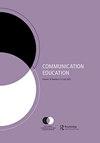编辑导语:传播教育学术研究方法
IF 0.8
Q3 COMMUNICATION
引用次数: 0
摘要
虽然传播教育研究使用了一系列方法,并且当前的传播教育的目标和范围明确表示欢迎“来自不同观点和方法的研究,包括定量、定性和批判/文本方法”,但过去一些方法的使用和接受程度存在局限性。与此同时,许多互补学科已经开发出新的或更严格的方法来使用广泛的认识论方法进行研究,这些方法可能有助于探索传播教育学术中深刻有意义的问题。在这个论坛上,我们邀请了一些文章来探讨我们可以从其他学科(以及我们自己学科的其他领域)学习的方法,以扩展我们在研究中使用的方法工具。作者被要求在他们的文章中回答以下问题:本文章由计算机程序翻译,如有差异,请以英文原文为准。
Editors’ introduction: research methods in communication education scholarship
While communication education scholarship has been conducted using a range of methods, and the current Aims and Scope of Communication Education are explicit about welcoming “scholarship from diverse perspectives and methodologies, including quantitative, qualitative, and critical/textual approaches,” there have been limitations in the extent to which some methods have been utilized and accepted in the past. At the same time, many complementary disciplines have developed new or more rigorous methods for conducting research using a wide range of epistemological approaches that could be useful in exploring deeply meaningful questions in communication education scholarship. For this forum, we invited essays exploring ways that we can learn from other disciplines (and from other areas within our own discipline) to expand the methodological tools that we use in our research. Authors were asked to address the following question in their essays:
求助全文
通过发布文献求助,成功后即可免费获取论文全文。
去求助
来源期刊

COMMUNICATION EDUCATION
EDUCATION & EDUCATIONAL RESEARCH-
CiteScore
3.10
自引率
34.80%
发文量
47
期刊介绍:
Communication Education is a peer-reviewed publication of the National Communication Association. Communication Education publishes original scholarship that advances understanding of the role of communication in the teaching and learning process in diverse spaces, structures, and interactions, within and outside of academia. Communication Education welcomes scholarship from diverse perspectives and methodologies, including quantitative, qualitative, and critical/textual approaches. All submissions must be methodologically rigorous and theoretically grounded and geared toward advancing knowledge production in communication, teaching, and learning. Scholarship in Communication Education addresses the intersections of communication, teaching, and learning related to topics and contexts that include but are not limited to: • student/teacher relationships • student/teacher characteristics • student/teacher identity construction • student learning outcomes • student engagement • diversity, inclusion, and difference • social justice • instructional technology/social media • the basic communication course • service learning • communication across the curriculum • communication instruction in business and the professions • communication instruction in civic arenas In addition to articles, the journal will publish occasional scholarly exchanges on topics related to communication, teaching, and learning, such as: • Analytic review articles: agenda-setting pieces including examinations of key questions about the field • Forum essays: themed pieces for dialogue or debate on current communication, teaching, and learning issues
 求助内容:
求助内容: 应助结果提醒方式:
应助结果提醒方式:


